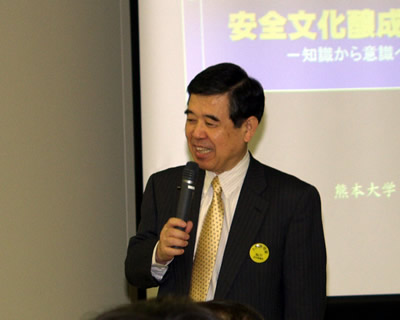
|
|
Michio Yoshida
Professor at the Education Center
Faculty of Education, Kumamoto University
|
This safety caravan is the 100th safety caravan and I feel very fortunate to be speaking at this notable safety caravan. I helped create the safety culture e-series “You are the Star! Safety Culture. –From Knowledge to Awareness, and to Action—”, which is a JANTI e-learning material. These materials incorporate the keywords that are stressed in considering safety such as “Fail-safe & Feel Unsafe”, “safety knowledge and safety awareness” and “certainty over probability”. From now I would like these points to be remembered when these materials are used and studied. With respect to developing a safety culture, the words safety “climate” and “culture” are often used, but what I would like to highlight the importance of is how to change the scale of the workplace right in front of you. For example, if a group of one organization becomes energized and the standards of conduct change, it has a major impact on other groups. And this in turn brings about changes to the culture and climate of the workplace overall. This is also a sub-issue of the e-learning education materials, but to make knowledge awareness and turn awareness into action, one’s sense of worth, responsibility and pride plays an important role. To feel these qualities, it is essential to have good personal relationships at the workplace. To bring about the desired situation, leadership from managers is also important. The atmosphere of the workplace changes through the energy of its leaders. By having all of the employees of the workplace think that “if I change people around me will change” and act in a positive manner, safety will certainly follow.
Finally, I would like to stress the importance of responsibility and pride with respect to one’s work. No one thinks “Not to cause an accident, I shouldn’t work”. The fact that one can cause an accident or make a mistake in one’s own work is proof that one is doing an important job. I hope that people have such a feeling with responsibility and pride, turn knowledge into awareness and turn that into action.
Comments from the questionnaires conducted after the presentation:
●It was easy to understand and interesting. I once again felt the need to always be aware as a manager of “eyes looking out and eyes looking in”. I think there is a tendency in the specialized field of nuclear power to have a narrow outlook towards things.
●I was again made aware of large effects of the unseen strengths of human relationships and group dynamics in safety culture. I want to work at skillfully incorporating assessments from my staff and improve group dynamics.
●Including the phrases “the atmosphere of the workplace is changed by its leaders” and “interpersonal relationships are an individual effort”, the rhetoric of today’s lecture was good, and I found the talk interesting.
●I was able to understand well that leadership is defined not only by individual characteristics but depends on one’s actions. Using the leadership PM theory, I hope to be helpful in responding to staff in the future.
These and other opinions and impressions were expressed in the questionnaires.
Afterward, Mr. Kawashima, Director of NSnet Division at the Japan Nuclear Technology Institute presented an overview of the activities of our organization.
|







